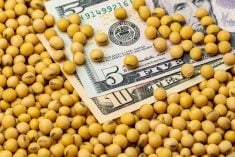Chicago | Reuters — U.S. grain and soybean futures fell on Friday as the spread of the new coronavirus triggered broad selling in commodities and equities.
Wall Street tumbled as fears of economic damage intensified with the global tally of cases crossing 100,000. Financial markets view the virus, which causes a flu-like illness, as the catalyst that could interrupt the longest economic expansion on record, now in its 11th year.
Futures prices for corn, which is used to make ethanol, faced additional pressure from the their link to energy markets, traders said. Oil prices tanked over eight per cent and hit their lowest since mid-2017.
Read Also

U.S. grains: Soybean prices rise as China-U.S. truce assessed
Chicago soybean prices rose on Wednesday, recovering some of the previous session’s losses, as Beijing’s confirmation that it was cutting tariffs on U.S. farm goods put attention back on a trade truce between the countries.
“The outside markets are causing a risk-off type of trade,” said Don Roose, president of Iowa-based agricultural broker U.S. Commodities. “There’s no doubt about it.”
The most actively traded corn futures contract lost 1.4 per cent to close at $3.76 a bushel at the Chicago Board of Trade (all figures US$). Soybeans slipped 0.8 per cent to $8.91-1/4 a bushel. The most-active wheat contract dropped one per cent to $5.15-3/4 a bushel at the CBOT.
Traders and analysts said prices could continue to weaken.
“We have virus fears back in the market and I think that it will get worse before it gets better,” said Ole Houe, director of advisory services at brokerage IKON Commodities.
The U.S. Department of Agriculture said on Friday it postponed a trade mission to Morocco because coronavirus was detected there.
More than 3,200 people worldwide have died from the respiratory illness. The Asian Development Bank said the outbreak is set to trim economic growth in developing Asia and around the world this year.
Traders are continuing to wait for China to ramp up purchases of U.S. agricultural goods, as it pledged to do in an initial trade deal signed in January.
China, the world’s top soybean importer, has granted tariff exemptions for some crushers to import U.S. soybeans, five sources told Reuters. However, Chinese importers are buying soybeans from Brazil, where prices are cheaper than in the United States, traders said.
“They’ve got these duty-free licenses, and so far it’s hands in their pockets,” Roose said.
China has also granted tariff exemptions for some importers to buy U.S. sorghum, wheat and distillers’ dried grains (DDGs), among other products, traders said.
The USDA reported that private exporters sold 234,688 tonnes of U.S. corn to Japan and 211,336 tonnes to unknown destinations.
The agency is set to release monthly supply and demand data on Tuesday.
— Reporting for Reuters by Tom Polansek in Chicago; additional reporting by Naveen Thukral in Singapore.










